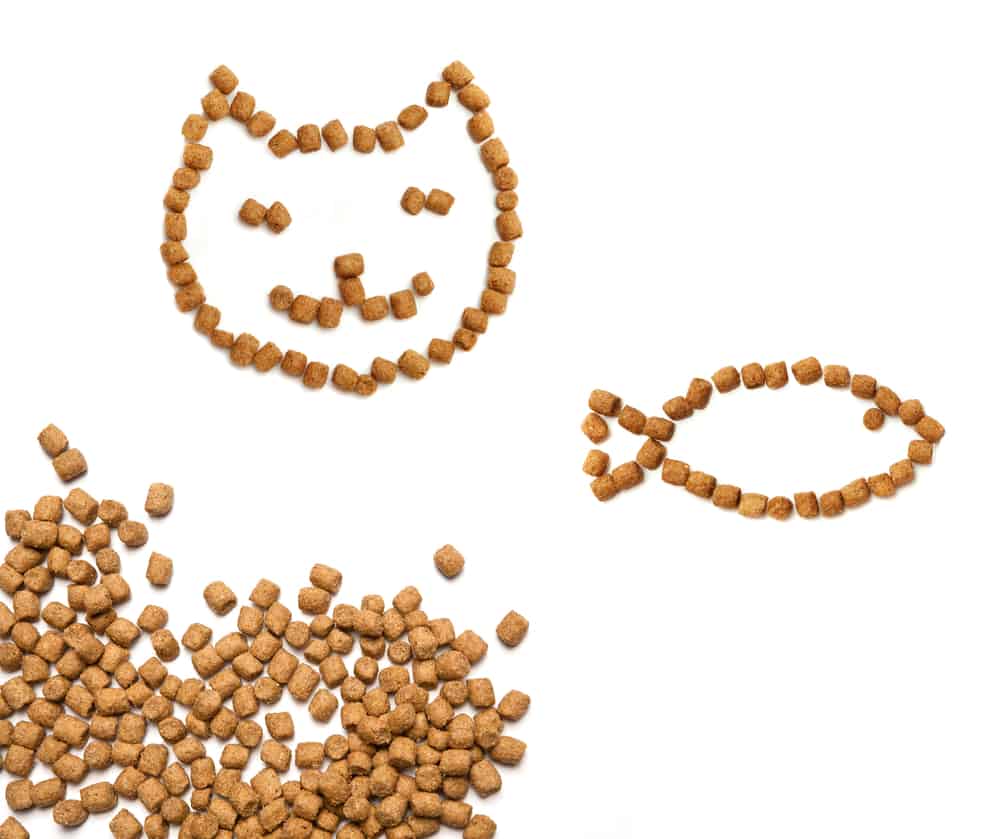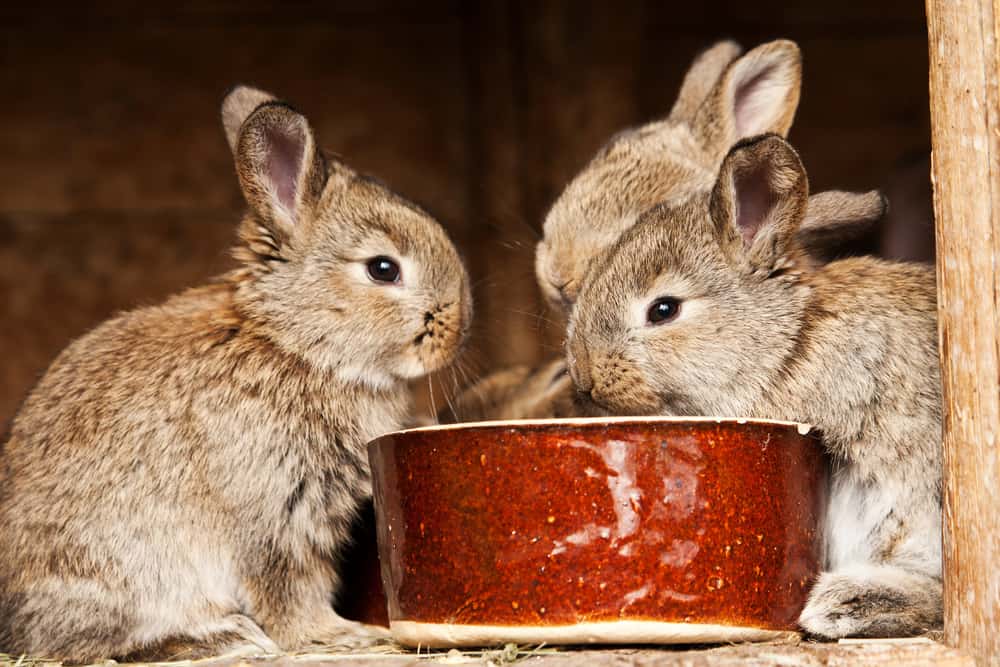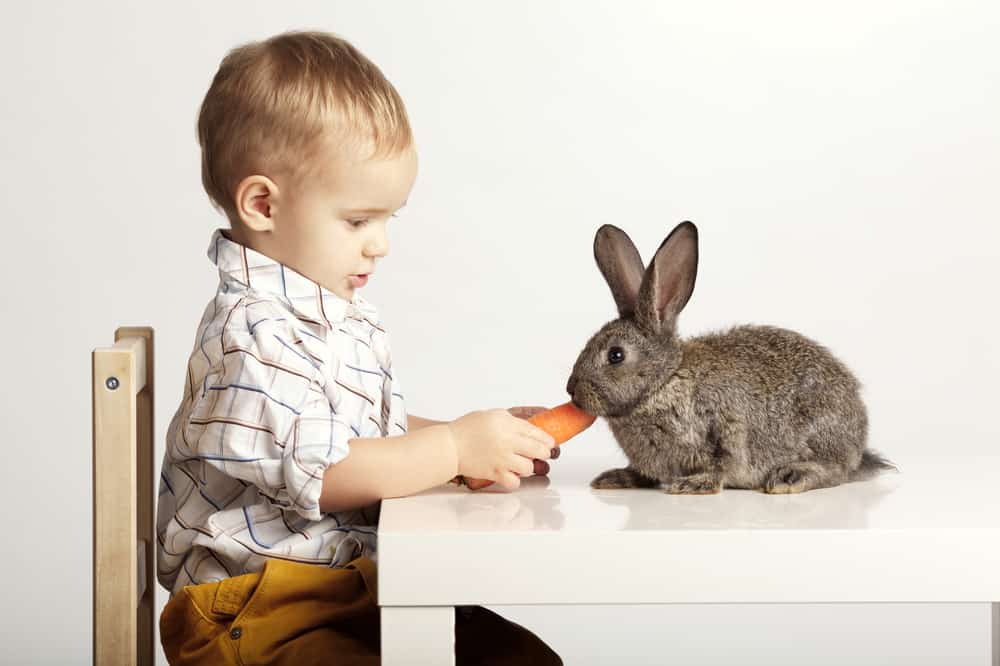
Whether you have a cat, a dog, or a rabbit, they all have very specific and differing dietary needs.
If you have more than one species of pet, it can be tempting to feed them the same things, but we need to remember that they’re not the same animal.
Knowing the proper diet for any of your pets can help give them a long, happy life.
Can rabbits eat dog or cat food?
No, you should never feed your rabbit dog or cat food. If they have access to it, they will eat it. Cat and dog foods are generally high in fat, carbohydrates, and protein. High protein diets can lead to kidney damage, while diets high in fat and carbs will lead to obesity.
Allowing your rabbit to eat dog or cat food can cause irreversible damage.
Rabbits love to eat and will eat bits and pieces of almost anything they can access.
Make sure that your rabbit doesn’t have access to your other pets food.
If you are keeping a rabbit as a pet, you will also need to know what the best diet is for them and how to keep hazardous foods away from them.
Should Rabbits Eat Dog or Cat Food?

Keeping our pets happy and healthy is an obligation that all pet owners share in order to provide the best life possible for our furry companions.
That’s why it is imperative that we take the time to understand our animal companion’s dietary needs.
All three animals have varying digestive tracts, and their diets should be designed accordingly. Rabbits are herbivores: this means that their diet consists strictly of plant material.
Domesticated dogs are omnivores,, which allows them to eat both plant and animal matter.
Then there are cats, they are considered to be obligate carnivores and survive predominantly off of animal tissue.
These differences in their digestive systems are what can cause health issues when rabbits are fed or have access to the dog or cat food.
Most dog and cat foods are manufactured to have a high concentration of protein, fat, and carbohydrates.
This is a suitable diet for those furry friends, but just not for rabbits.
Potential Side Effects of Eating Dog or Cat Food
Rabbits have eating habits that are similar to other herbivorous grazing animals.
They will nibble on their food and consume the nutrients they need throughout the entire day versus eating one or two large meals.
This means that if there is any dog or cat food left out where they can find it, they likely eat some, but will only eat a small amount.
Rabbits are not good at determining which food items can be toxic or harmful to their health. They simply eat the food that they find in their path.
However, even small amounts of dog and/or cat food can negatively impact the digestive system of a rabbit.
It might take some time for the health effects to show, and no symptoms may be obvious at first, if at all.
Any side effects and the overall severity of the health issues will vary from bunny to bunny.
Kidney Damage
Dogs and cats both need high levels of protein in their diet, whereas rabbits do not. Eating excessive amounts of protein will cause kidney damage.
Since rabbits are herbivores and have a gastrointestinal system designed only for plant matter.
They will have an inability to properly process and digest large levels of protein, especially animal protein.
Urinary Tract Infections
Dog and cat food are typically high in calcium. Foods high in calcium can cause UTIs and kidney infections in rabbits.
Rabbits can eat calcium in small quantities, and there is usually some calcium in the hay that they eat every day.
The concentration of calcium found in their hay is safe for rabbits, but dogs and cats foods than to be fortified with excess calcium.
Rabbits are unable to properly process the excessive calcium, and then it begins to build up in their urinary tract and kidneys causing infections and even kidney stones.
Dental Damage
Both dogs and cats have teeth that are designed to be able to tear animal flesh, whereas rabbits have teeth designed for grinding plant materials.
A rabbit diet lacking in high fiber grassy materials like hay can lead to dental diseases.
Food that requires grinding and differing movements like hay, pellets, and some leafy greens helps to keep the rabbit’s teeth healthy.
Obesity
Animal foods are naturally high in fat, and grains are naturally high in carbohydrates.
Both cat and dog foods have high levels of fat and carbohydrates.
When a rabbit has a diet high in both fat and carbs, it will lead to obesity, which brings on a list of health issues all on its own.
Rabbits that are overweight or obese struggle to perform everyday movements and will no longer be able to get the proper amount of exercise each day.
Rabbits also have very fragile bones. Excessive weight will cause strain on their joints over time.
Intestinal Distress
Even in small amounts, dog and cat foods disturb the intestinal flora of a rabbit.
The animal products such as fat and proteins found in cat and dog food are not easy for rabbits to digest.
Their intestinal enzymes are not equipped or designed to process animal matter; they can only digest plant matter.
This then can lead to intestinal distress and in some cases sudden death.
Signs and Symptoms
It can sometimes be hard to tell if your rabbit is experiencing any side effects from eating even dog or cat food, but there are some warning signs to look out for.
Common and concerning symptoms, your rabbit has eaten something toxic and needs medical intervention:
- Glazed Eyes
- Vomiting
- Diarrhea
- Drinking water in excess
- Restless Behavior
- Lethargic or weak behavior
These are all potential symptoms that your rabbit has eaten anything toxic, not just dog or cat food.
If their behavior changes dramatically in any way, then there is cause for concern.
One sure-fire way to know your rabbit isn’t feeling well is to try giving them their favorite treat.
If they aren’t interested in eating it or they don’t eat all of it, then something is wrong.
Even if your rabbit does not demonstrate any or all of the signs or symptoms listed above, but you are aware that they’ve consumed dog or cat food in any amount, bring them to the vet as soon as possible.
It can take some rabbits longer to show signs of gastrointestinal distress than others, and your vet will provide you treatment recommendations that could save your bunny’s life.
Preventative Measures
Even if you didn’t feed your rabbit cat or dog food directly, that doesn’t mean that they can’t find some around the house to eat.
If you have a cat or a dog in your household along with a rabbit and leave your other pet’s food on the floor so they can eat as their leisure, then your rabbit will have access to it while it is out of its cage.
Instead of keeping your cats food on the floor, consider putting it in a place that only your cat has access to, such as a shelf or table.
This will prevent your rabbit from going to the cat food bowl when it is roaming around the house.
If you have a dog, you just have to put the dog food up when the rabbit is out or only feed the dog twice a day when the rabbit is in its hutch.
Both cats and dogs can be messy at times, especially when they eat. Keep this in mind as they may spill bits of their food onto the floor.
Be diligent in cleaning up after your dog or your cat, so your rabbit doesn’t stumble upon some kibble to nibble.
One other primary factor impacting your rabbits foraging behaviors will be how well they are fed.
Keep them satisfied with proper food to graze throughout the day to keep them full.
Give them new foods to try (only if you know they’re safe) from time to time and let them enjoy treats.
This will keep them from being hungry, and they will not become bored with their food either.
Other Hazardous Food NOT Suitable For Rabbits
Rabbits love to eat; in fact, they eat up to 30 times per day. Feeding them a species-appropriate diet will help them to avoid foods that are potentially toxic.
While there are foods that are toxic to all of our pets, rabbits have very specific dietary needs, and there are a number of food items that can be toxic or unhealthy for them to consume.
Foods that are considered toxic or poisonous to rabbits are those that could cause immediate death.
Some of the most common examples of toxic food include:
- Avocado
- Rhubarb
- Fruit Seeds, pits, or pips
- Iceberg Lettuce (All light-colored lettuce)
- Chocolate
- Sugary and/or processed foods
- Onions, garlic, shallots, and chives (Allium vegetables)
- Potato tops
- Yogurt
Just as dog and cat food isn’t usually considered to be toxic to rabbits, it can cause health issues down the line.
Some foods don’t have immediate side effects and often don’t cause death unless eaten often or in large amounts.
Here are some foods rabbits should avoid eating:
- Bread, pasta, and crackers (High carbohydrate foods)
- Cauliflower
- Cereal (i.e. Muesli)
- Nuts
- Dog and Cat Food
- Raisins (Most Dried Fruit)
- Parsnips
- Potatoes
- Walnuts
- Peanut Butter
- Oatmeal
- Hamster Food
- Chard or Silverbeet
Safe Foods For Rabbits

Keeping your rabbit well-fed and happy with their meals is one of the best ways to stop them from foraging.
In comparison to other common pets, rabbits have specific dietary needs that owners should stick to throughout their rabbit’s life.
If your rabbit does not have continued access to the proper nutritional diet, they run the risk of becoming quite sick and will use any freedom to forage what they can find.
Recommended Diet For Rabbits
- Unlimited Access to Water
- Unlimited Hay
- 25-50g of High Fiber Rabbit Pellets per day
- 1-3 cups of Leafy Green Vegetables per day
- Growing Grass
Like most herbivores, rabbits need a diet high in fiber. One of the best sources of fiber for a rabbit comes from hay.
Keep in mind when choosing hay appropriate for your rabbit that you buy a variety that is low in both calcium and protein.
Timothy Hay is widely recommended for rabbits by veterinarians, but you may need to try multiple varieties to see what they prefer.
Leafy Greens Rabbits Can Eat
While rabbits are getting the bulk of their calories and fiber from their hay and pellets, you should feed them leafy greens and other vegetables occasionally.
This gives them variety as well as providing essential vitamins and minerals.
Leafy greens and a few other vegetables not only give them extra nutrients, but they also provide a new chewing motion different from that of hay or pellets.
These chewing motions will strengthen your bunny’s teeth and help them stay healthy into old age.
Remember, not all leafy greens are safe for rabbits (i.e. iceberg lettuce is toxic).
Rabbits should eat 1 cup of leafy greens per day (1 cup per 2lbs of body weight).
When you feed them, try to include a variety of greens each time.
Here is a list of rabbit approved leafy vegetables you can give them daily:
- Kale
- Artichoke Leaves
- Radish Tops
- Beet Greens
- Dark Green Cabbage
- Arugula
- Watercress
- Turnip Tops
- Collard Greens
- Carrot Tops
- Dandelion
- Spinach (only occasionally)
- Some Sprouts and Microgreens
Other Vegetable Rabbits Can Eat
Be cautious as to how many new vegetables you introduce into their diet at a time.
Give them small amounts of new foods and monitor their behavior. Stop feeding them a vegetable if they begin to have bowel irregularities.
Leafy greens should be the main vegetables you provide to your pet rabbit.
There are other vegetables that you can give them as a treat from time to time.
These should only be given in the amount of 1 tablespoon per every 2lbs of body weight.
Some other types of vegetable rabbits can enjoy:
- Bell Peppers
- Celery
- Squash and Pumpkin
- Green Beans
- Chicory
- Carrots
- Asparagus
- Broccoli (in moderation)
- Brussel Sprouts
- Some Herbs (basil, cilantro, rosemary, mint, sage, oregano, and thyme)
- Edible Flowers such as Hibiscus
Related Article: Can Rabbits Eat Tomatoes? Is it safe? Is it toxic?
Fruit Rabbits Can Eat
Fruit can be an enjoyable treat for a rabbit, but keep in mind that all fruit has high sugar content. It should be seen as a treat that you give to your rabbit on occasion, not daily.
Fruit’s acidity and sugar content can cause damage to their teeth. For most fruits, you should leave the skins on as the skin has nutritional value.
Try to buy organic produce for your bunny and wash skin thoroughly before feeding.
You will need to limit their fruit consumption to no more than 2 tablespoons per day.
Fruit should make up no more than 10% of their total diet. As with most animals, rabbits love sugary treats.
So, it is up to you to limit their fruit consumption. Only give them access to the appropriate amount, or they will eat too much.
Since they love fruit but are only allowed to eat it minimally, fruit makes the perfect training treat and incentive.
Some fruits that are safe to feed rabbits include:
- Raspberries, blackberries, and blueberries
- Strawberries (with leaves)
- Apples
- Currants
- Mango
- Melon (include peel)
- Banana
- Papaya
- Pineapple (remove skin)
- Peaches, nectarines, and plums
- Pears
- Cherries (remove pits)
When feeding your rabbit fruit, ensure that you remove all seeds, pits, and pips. These are poisonous and should not be consumed.
You should also never give rabbits dried fruit. Only provide them with fresh fruit in moderation.
Dried fruit has a higher concentration of sugar and is dangerous even in small amounts.
Other Food Safety Advice For Rabbit Owners
Allowing your rabbit some freedoms around your house and in their diet can make them quite happy.
Still, it is important to monitor them while they roam. Remember, rabbits will eat almost anything, even if it is toxic to them.
Providing them with a well-balanced diet to fulfill their optimal nutritional needs is one thing, but here are a few other food safety tips to remember:
- Hay should be the bulk of a rabbits diet, and other pellets or vegetables should be used simply as supplementation to that diet.
- Before introducing fresh foods, like leafy greens, into their diet, rabbits should eat grass or hay for a minimum of 2 weeks.
- Introduce new, fresh foods slowly and in small amounts to allow their gastrointestinal tract to adjust.
- The bulk (75%) of their fresh food diet should consist of a variety of safe to eat leafy greens.
- Don’t feed them the same leafy greens every day. Mix it up to give them a variety of taste, texture, and nutritional value.
- Even though they eat a lot of leafy greens, that doesn’t mean that they are all safe.
- Foods high in starch or sugar should be fed in lesser amounts than that of leafy greens.
- Provide an unlimited water supply via a bowl to your rabbit. Don’t use a bottle.
- Only feed your pet rabbit foods that you know for certain are safe and non-toxic.
- If you let them roam your house or your yard, monitor what they eat and take preventative measures to keep them away from harmful foods.

